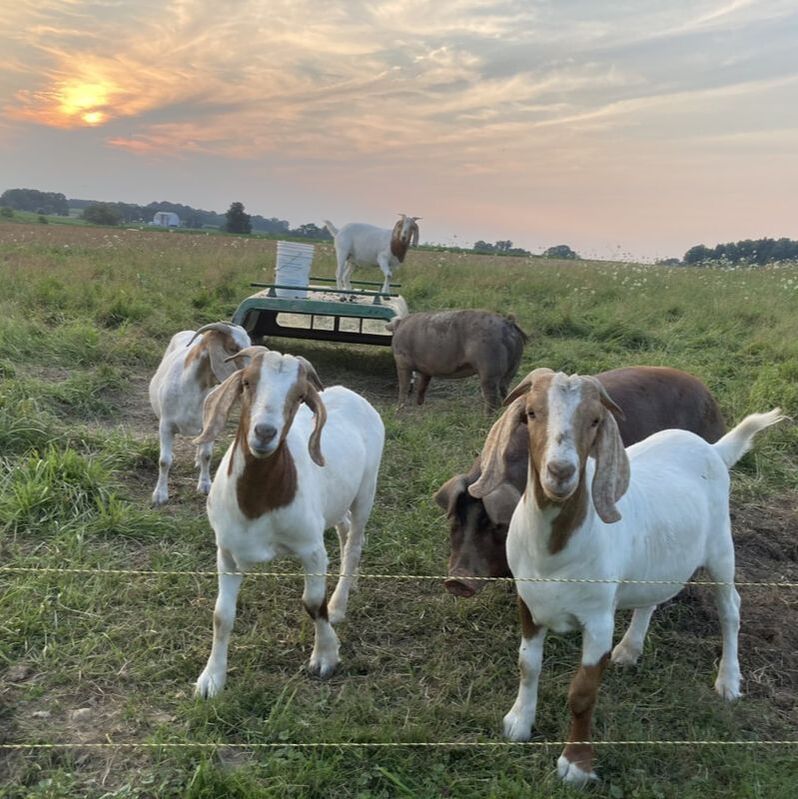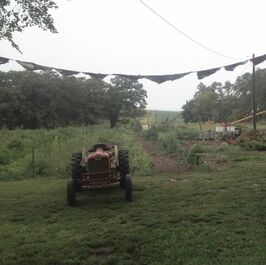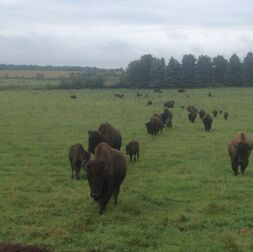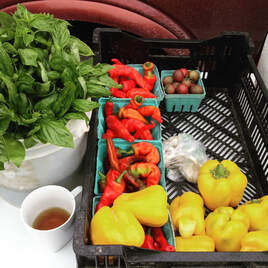I have been researching and working in the human dimensions of U.S. agriculture since 2008.
I conduct research to understand the drivers of agrarian change. When and why do agricultural systems transition into something new? When and why do they persist as they are? How do we know? These questions are rooted in longstanding debates about the relationships between agriculture and industry, countries and cities, the rural and the urban. They are also increasingly urgent considering climate change’s impacts on global food production and uncertainty around how to support the next generation of farmers.
I approach agricultural research from a critical food systems perspective, and my research generally focuses on the social worlds and human dimensions of sustainable agricultural production in the United States. I draw upon my anthropological training to conduct ongoing ethnographic research with alternative farmers in Iowa, and I also bring mixed qualitative methods to interdisciplinary research teams working across food systems spaces. In addition to the projects below, I regularly collaborate with researchers and staff at ASU's Swette Center for Sustainable Food Systems.
I approach agricultural research from a critical food systems perspective, and my research generally focuses on the social worlds and human dimensions of sustainable agricultural production in the United States. I draw upon my anthropological training to conduct ongoing ethnographic research with alternative farmers in Iowa, and I also bring mixed qualitative methods to interdisciplinary research teams working across food systems spaces. In addition to the projects below, I regularly collaborate with researchers and staff at ASU's Swette Center for Sustainable Food Systems.
Current Projects
|
How do we know what we know about food systems?
I'm currently developing a new research area focus that analyzes the politics of knowledge around food and agricultural systems in the United States. We ask, how do past food systems priorities determine the limits of what is knowable about agriculture today, how do data histories and data assumptions shape food system possibilities, and where are the levers for change? Publications: Rissing, A., Burchfield, E. K., Spangler, K. A., & Schumacher, B. L. (2023). Implications of US agricultural data practices for sustainable food systems research. Nature Food, 4(3), 213-217. https://doi.org/10.1038/s43016-023-00711-2 |
|
Resown: Post-industrial agrarian change
Iowa is the country’s leading producer of corn, soybeans, and hogs, yet its agricultural landscapes produce more than export-oriented commodities. Small-scale, alternative farms are emerging alongside Iowa’s fields of grain. My current book project is an ethnography investigating the connections between industrial and alternative agriculture in Iowa. The book examines the intersections between Iowa’s ostensibly distinct systems of agricultural production to understand how overlapping rural social worlds create new approaches to farming. I analyze the resulting tensions and opportunities as windows into broader post-industrial transition pathways. |
|
Integrating human and biophysical factors to project future cropscapes under climate change.
This project engages farmers and food systems stakeholders in diverse agricultural systems to investigate the social and environmental factors that drive agricultural futures. Our team is integrating historical analyses, predictive modeling, expert insights, and farmer perceptions to identify emergent crops, technologies, policies, and on-farm realities that might alter probable futures in each region. National Science Foundation Dynamics of Integrated Socio-Environmental Systems. Award #2307271. |
|
Managing Markets: Assessing the Relationship Between Farmers Market Management and Farmers' Economic Viability and Quality of Life
This project explores a new area of interest: the informal and formal rules of local food system governance. Using online content analysis, focus groups, and interviews, this project asks how different kinds of farmers markets deploy different kinds of managerial strategies--and how these variations create different outcomes for managers and vendors alike. January 2024: See a presentation on this topic I gave with Dr. Hilary King to the Farmers Market Federation of New York here! USDA Sustainable Agriculture Research and Education (Southern Region). Award #LS22-368. A sister project, funded through a research cooperative agreement with the USDA Agricultural Marketing Services, seeks to understand variations in the management and community presence of markets that are managed by outside organizations (such as a parks and recreation department, a multi-market collaboration, or a community development group). |
Previous Projects
What explains crop diversification?
As a Postdoctoral Researcher at the FACES lab in the Environmental Sciences department at Emory University, I led the qualitative phase of a USDA NIFA-funded project that sought to better explain county-level trajectories of crop diversification by contextualizing current cropscapes within relevant socio-political histories.
Publications:
Publications:
- Rissing, A., & Burchfield, E. (2024). Crop diversification as landscape change: using land systems science to understand agricultural trajectories in North Carolina. Regional Environmental Change, 24(1), 1-14. https://doi.org/10.1007/s10113-023-02162-8
The Ohio Farm Poll
As a member of the Center for Community and Working Landscapes in the School of Environment and Natural Resources at The Ohio State University, I was part of the team that launched the inaugural Ohio Farm Poll in 2020 to understand how farmers across the state were responding to the weather and market conditions of 2019. The poll was re-launched in 2023, creating a longitudinal dataset that straddles the Covid pandemic.
Project website: The Ohio Farm Poll
Publications:
Project website: The Ohio Farm Poll
Publications:
- Rissing, A., Jackson-Smith, D., Inwood, S., & Woods, T. (2023). Farm households and the elusiveness of social sustainability: Contrasting the emotional registers of organic and conventional producers. Journal of Rural Studies, 102, 103074. https://doi.org/10.1016/j.jrurstud.2023.103074
Farmers' Access to Childcare
In collaboration with The Ohio State University and The National Farm Medicine Center, this integrated research and extension project seeks to understand how farmers access and navigate childcare when raising children on farms. We examine the factors shaping farmers' use of childcare, its role as on-farm risk mitigation, and the role of policy supports.
Project Websites: Linking Childcare to Farm Children Safety and Childcare, Farm Economic Development, & Quality of Life
Publications:
Project Websites: Linking Childcare to Farm Children Safety and Childcare, Farm Economic Development, & Quality of Life
Publications:
- Becot, F., Inwood, S., and Rissing, A. (2022). Childcare for farm families: A key strategy to keep children safe yet largely absent from farm programming. Frontiers in Public Health. https://doi.org/10.3389/fpubh.2022.1043774
- Rissing, A., Inwood, S., & Stengel, E. (2021). The invisible labor and multidimensional impacts of negotiating childcare on farms. Agriculture and Human Values, 38, 431-447. DOI: https://doi.org/10.1007/s10460-020-10162-1
- Research Brief: Unmet childcare needs are pervasive issue on family farms but guidance largely absent from farm programming. “Linking Childcare to Farm Children Safety” Project: Research Brief #1 February 2023. Florence Becot, Shoshanah Inwood, Andrea Rissing.




